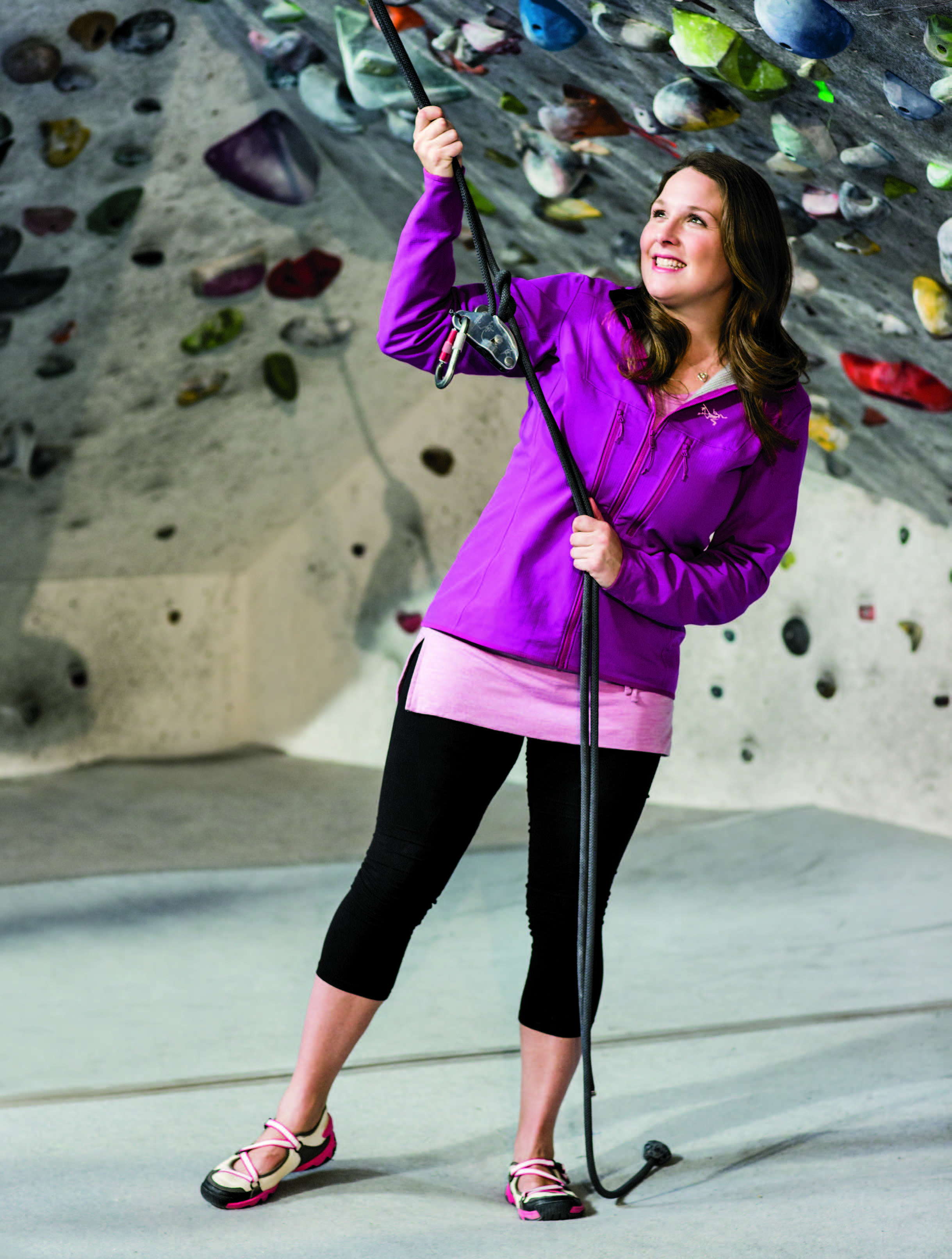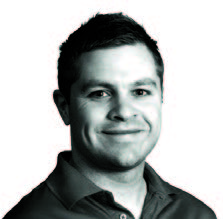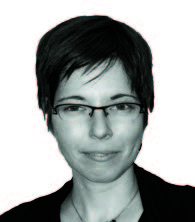Share this page
By Stuart Foxman
Photos: Anya Chibis, Hair & Makeup: Michelle Rosen/Judy Inc.

Samantha Laforêt, OCT, finally obtained her teaching credentials in 2012 — after working in education since she was a teenager.
Starting at 16, Laforêt spent summers at Toronto’s Royal Ontario Museum (ROM) as a camp counsellor. The activity-based programs were inspired by the ROM’s amazing collections and research.
Later, she worked for four years at a private art school, as an assistant with the children’s education programs. For the past five years, Laforêt has been a program instructor at the ROM. Through ROMKids, she runs Tiny Tots early learning programs, and also teaches weekend, holiday and summer programs (gallery-based lessons, art projects and science experiments) for children. The rest of the time, Laforêt leads school visits. On the side, she also tutors.
Unlike the teachers who use their initial qualifications as a springboard to a career outside the classroom, Laforêt had those other educational jobs first. What she lacked was the formal training. So in 2011–12, she attended teacher’s college.
“ There are so many ways to bring knowledge to people and open them up to learning.” —Samantha LaForêt
“I wanted to broaden myself pedagogically,” she says. “It made things clearer for me, and I’ve become even more committed to education.”
Since then, she has taken two AQs (Special Education, Part 1 and French as a Second Language, Part 1) to continue her personal learning. Whether in her role or the classroom, she says teachers encounter students who have very different needs. With the AQs, “It was helpful to get that grounding in what to expect, and what modifications you might make or strategies you might use.”
Laforêt feels fortunate to work somewhere learning comes to life through artifacts, from the dinosaur exhibit to the Code of Hammurabi. As part of a travelling exhibit, the ROM has an incredible replica of that ancient Babylonian law code, written in cuneiform. “When the students see it — something they’re learning about in school — they go crazy. There’s something to be said about coming up close to actual objects.”
How does she view her role? “As someone who helps people engage with the millions of artifacts in the museum, and form their own understanding of whatever I am showing them.”
She could see herself in a school classroom one day, one reason why she wants to continue her education as a teacher. “But there are so many other ways to bring knowledge to people and open them up to learning. That’s not limited to the classroom. I find my job rewarding every day.”

While pursuing her Master of Education at Brock University, Jen Hanson, OCT, received this advice from a few professors. “They said look for something you love, and you can make that into something you want to be,” she says.
Hanson had spent a year teaching visual arts to Grades 4 to 10, but yearned for new challenges. For her M.Ed., Hanson researched the role of outdoor adventure and experiential learning in the health and wellness of adults with type 1 diabetes.
“ When people ask what I do, I tell them I’m a teacher — just not in a classroom.” — Jen Hanson
That focus reflected Hanson’s life: She was diagnosed with type 1 diabetes at age three, and went on to lead an adventurous life. Family camping trips into Algonquin and Killarney provincial parks fostered a love for the outdoors. Hanson spent 18 summers as a camper and staff member at Camp Huronda, a camp in Huntsville for children with diabetes. She played competitive sports through high school, obtained an undergraduate degree in kinesiology, and wrestled at provincial and national levels through high school and university.
During her M.Ed. studies, Hanson learned of a new Toronto organization called Connected in Motion, which provides adventure-based activities for adults with diabetes, and joined it, eventually becoming executive director.
Connected in Motion links adults with diabetes, allowing them to share their challenges, strategies and successes. That happens through day programs, 10-day canoe trips and through three-day events held across Canada. Outings include outdoor activities and educational sessions.
Hanson says leaving a traditional teaching career was a big move. What helped was getting in touch with her true calling. “I still identify with the process of education,” she says. “When people ask what I do, I tell them that I’m a teacher — just not in a classroom.”

When he played professional rugby, Stuart McReynolds, OCT, was a utility back — someone who can play multiple positions. The jack-of-all-trades description suits McReynolds, who has combined several interests into a career as Senior Coordinator, Education Programs for the Canadian Paralympic Committee (CPC) in Ottawa.
The British-born McReynolds has played rugby in the United Kingdom, New Zealand, Spain and Canada. It was in New Zealand that he obtained his teaching qualifications. McReynolds taught there, and later in Nova Scotia in 2011.
His teaching background is in physical education, special education and business. In schools, he noticed how students with physical disabilities were excluded from gym class. It struck him as a lost opportunity.
Now at the CPC, McReynolds manages Changing Minds, Changing Lives, a Professional Development presentation about the lives of persons with a disability and the benefits of sport and physical activity. Before McReynolds came aboard, it was directed solely at health care professionals. “We created new content to target teachers too.”
His other portfolio, the Canadian Paralympic Schools Program, has three components: Paralympic Schools Week (PSW), to raise awareness about the Paralympic movement and parasport; games-based lesson plans and activities; and a parasport skills program that aims to develop physical literacy in all children.
“There’s a huge inactivity crisis,” says McReynolds. Rather than marketing parasport strictly for people with disabilities, “We want to see every child playing a parasport. It’s a unique opportunity to develop fundamental movement skills, while providing education around equity and inclusion — the differences we all have. That’s a whole cultural change, and it starts in the school system.”

Every time she goes to work at Science North, Cathy Stadder Wise, OCT, sees a 75-foot reminder of her first job there — a fin whale skeleton hanging from the ceiling.
Upon joining the Sudbury science centre in 1985, Stadder Wise was assigned to the team assembling the skeleton. It’s not what she expected when she graduated from teacher’s college. She got on the supply list in Sudbury, but teaching jobs were scarce. When a contract job at Science North opened up, Stadder Wise jumped at it.
She has remained there ever since, and is currently Senior Scientist, Informal Science, Education and Northern Programs. “When you have a certain set of skills, you can use them in a variety of ways,” she says. “I saw broader possibilities.”
Science North has given her the chance to experiment with those possibilities. Her roles have included developing workshop material for teachers (to better understand the science curriculum), conducting outreach in schools, designing programs and running summer science camps in 26 communities throughout Northern Ontario.
In the museum world, she says formal programming involves things like bringing in a class and doing some sort of lesson. The “informal science” in her title refers to activities such as family outings, science camps, workshops and guest speakers.
Though she has been at Science North for over 28 years, Stadder Wise places a priority on her College registration. “Staying connected to the educational milieu has always been important to me, because I value learning,” she says. She has worked extensively on teacher education and hired many B.Ed. students for summer programs: “Being able to say I’m an OCT gives me street cred.”

Some people dream of travelling the world. For Marie-Christine Payette, OCT, sightseeing isn’t enough. Her key to appreciating another culture is language. She speaks English, French and Spanish, understands Italian, and used to speak German.
“When I was seven, I told people I would speak all the languages on the planet,” she recalls. “I didn’t know how many there were.”
Payette grew up in La Tuque, Que., about 160 km north of Trois-Rivières. With her love of languages, she studied translation in college and university, then taught ESL at a First Nations high school and FSL at a La Tuque high school. She later worked as an assistant teacher at a Montreal private school. Eventually, Payette’s principal suggested she pursue teacher’s college.
She did, in Ottawa, but after graduating found it hard to find a position. Payette wondered what else she could do with her combined abilities. She decided to start her own company, Les Traductions de Marie, and took on translation, editing and proofreading projects.
“It’s okay to find yourself in another opportunity to use your education skills and background.”
Her assignments are wide-ranging — from her client BlooBuzz, a video games maker, to publisher Perro Éditeur, for which Payette edits fantasy books for teens. She also finds herself in demand for education-related projects. The Commission scolaire de l’Énergie and the Commission scolaire du Chemin-du-Roy hired Payette to edit a teaching guide on entrepreneurship for Grades 5 and 6. She viewed the job for these school boards not only as an editor but also with a teacher’s perspective, adding comments that she felt would improve how teachers could apply the lessons.
Payette also worked with Quebec’s Ministère de l’Éducation on a project evaluating books. She classified over 1,000, according to reading level for Grades 1 to 6. “Reading all those books, I’d find typos and email the publisher to offer my services. That got me some clients.”
Payette also writes book reviews for the magazine Lurelu, and for this publication, Professionally Speaking. Would she return to teaching? “I once thought I’d be a teacher for life. Right now, I feel good about what I’m doing. It’s okay to find yourself in another opportunity to use your education skills and background.”